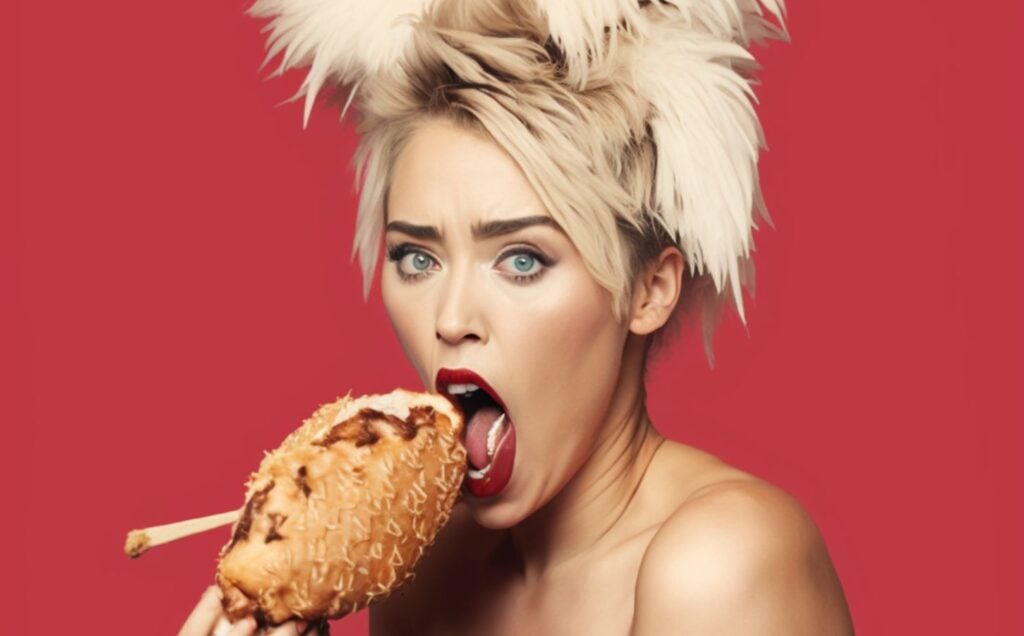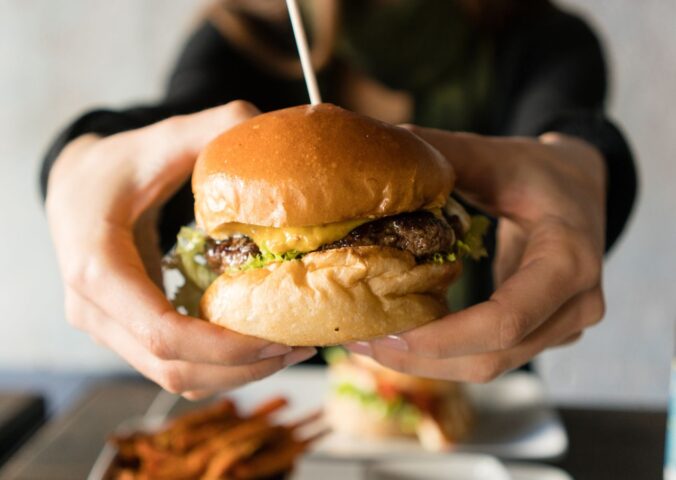This is a sponsored post * [what is this?]
Miley Cyrus, Mike Tyson, Bear Grylls, Jenna Ortega — these are just a few names in a long list of celebrities who have quit their plant-based diets.
While it’s easy to ignore the news as unimportant celebrity gossip (or use it as an excuse to make judgments), there’s something really important about these stories that often gets overlooked:
The reason they’re no longer vegan or plant-based.
Celebrities are just people, making decisions based on what feels right to them at the moment. And because they’re famous, we get a peek inside their vegan journey (and downfall).
This can be a good thing.
What celebrity ex-vegans can teach us about growing the plant-based movement
While a celebrity’s decision to stop eating plant-based may be highly publicized, it’s probably not unique.
Could it be that they just weren’t committed to the ethical side of veganism or the mission? Maybe.
But their level of commitment really doesn’t matter that much. Because the healthier vegans are and the better they feel eating plant-based foods, the stronger we are as a movement. And that, in turn, is better for the animals and the environment.
So if a celebrity stopped because they struggled with an issue — a deficiency, lack of calories, or difficulty adjusting, for example — it’s a good indicator that other people are having the same problem.
And that’s on us, the community. Not the celebrity (or anyone else).
Instead of dismissing those reasons or blaming the person, we’re better off as a community if we learn from them. We can discover new ways to address those issues. We can communicate and share appropriate resources and information that will keep others from having the same struggle, and tackle the problem head-on.
So let’s put this into action. What can we learn from some of the most widely publicized celebrity former vegans?
Miley Cyrus and her reported brain fog
Global superstar Miley Cyrus was long a vocal champion for the vegan movement. That is until September 2020, when the musician shared on The Joe Rogan Podcast that she had started eating fish.
“I was vegan for a very long time,” she said. “I’ve had to introduce fish and omegas into my life because my brain wasn’t functioning properly.”
What we can learn:
Brain fog or lack of clear thinking is a common complaint heard from vegans (or more often, former vegans).
And according to Krista Gast, a plant-based Registered Dietitian (RD), it’s for good reason:
“DHA and EPA omega-3 fatty acids are essential nutrients for any healthy brain. But they can be difficult to obtain through a whole food plant-based diet alone. Being deficient in DHA and EPA omega-3s can lead to all sorts of issues, from decreases in optimal brain function to nervous system regulation.
We find ALA omega-3s in plant foods like flaxseeds, walnuts, chia seeds, and hemp seeds, and many people believe that’s all we need. The challenge is that our body is inefficient at deriving DHA or EPA from ALA. Research suggests that only 1-10 percent of ALA is converted into “physiologically effective levels” of DHA or EPA.
That’s why I recommend vegans and those following a whole food plant-based diet regularly consume foods like seaweed, which naturally contains DHA and EPA, to get some of these essential fatty acids. And, to take an algae-based omega-3 supplement to make up for the rest.”
Testing your omega-3 fatty acid levels is easier than ever, which makes optimizing your nutrient intake for long-term health more accessible.
Mike Tyson’s protein problem
Mike Tyson, heralded as one of the greatest heavyweight champions of all time, credits a plant-based diet for giving him “another opportunity” at life.
In 2013, he told Oprah: “I just felt like changing my life, doing something different. And so I became a vegan. Becoming a vegan, it gave me another opportunity to live a healthy life … High blood pressure, almost dying, arthritis and once I became a vegan all that stuff diminished.”
Tyson followed a plant-based diet for 10 years before giving it up in 2020. Like many others, he claims to have quit because he was no longer getting the results he was looking for.
“I stopped because of the training and because of what I wanted my body to look like and the strength that I wanted to possess,” he said, also on Rogan’s podcast.
What we can learn:
As much as those of us in the vegan community see athletes — even strength athletes — thriving on a plant-based diet, it’s still considered radical to get all of your protein and nutrients from plants.
And some studies indicate that extra care may be needed for vegan athletes.
For example, researchers have found that plant-based protein may not be as bioavailable as animal protein. While it’s not much, additional protein intake (in particular, lysine-rich foods) is often recommended for vegans, especially those with certain athletic goals.
RD Gast says that “while the US recommended daily allowance of protein is 0.8 grams per kilogram of body weight (.36 grams per pound), vegan athletes may require more protein to help repair muscle tissue.
A study published in the International Journal of Sports Nutrition concludes endurance athletes benefit most from 1.2 to 1.4 daily grams per kilogram of body weight. Meanwhile, strength athletes do best with 1.4 to 1.8 grams per kilogram.”
Another issue Tyson may have faced is simply not getting enough calories on his plant-based diet to support his desired physique.
For people who are interested in specific strength goals, one of the worst things we can do as a community is pretend these types of considerations don’t exist. Challenges exist with any diet, it’s just a matter of identifying them and teaching people how to optimize their diet for best results.
Why Jenna Ortega stopped being vegan
Jenna Ortega recently confirmed that she ditched her plant-based diet while filming the hit Netflix show, Wednesday.
Ortega cited difficulty with the types of food available in Romania, where the team was shooting.
What we can learn:
You don’t have to travel to Romania to hear people talk about how limiting a plant-based diet can feel. This, in turn, leaves many concerned about deficiencies.
So how do we combat this?
When asked about deficiencies on a plant-based diet, Gast notes that, “All diets — even an omnivorous diet — are subject to nutrient deficiencies.
Nutrient gaps may vary depending on the diet, but often lack of diversity of foods and consistency of optimal nutrient intake plays a significant role in deficiencies. Dietary supplements can be recommended for optimal nutrition, no matter if you’re plant-based or not.”
While the plant-based diet contains an abundance of nutrients, it’s important to acknowledge that depending on personal health, location, and food access, additional dietary supplements may play an important role in meeting your nutritional needs.
For plant-based eaters traveling or living in areas where food options may be limited, additional planning or care is likely needed – either to keep someone healthy or to help eliminate any lingering concerns or doubts about whether or not they are meeting their nutritional needs.
Some celebrities quit eating plant-based, but you don’t have to
A plant-based diet is the most powerful diet in the world — for your long-term health, for its positive impact on the climate, and for the wellness of animals.
Millions of healthy vegans are thriving all over the world. But no diet is perfect, and all diets can lead certain people to struggle.
Due to systemic challenges surrounding food, individual goals or health histories, and accessibility depending on location, it’s important to understand and address certain areas of your diet to ensure you thrive, long term.
For new plant-based eaters, that may include asking for advice and educating yourself, plus thoughtfully supplementing as needed.
Because oftentimes — whether you’re a celebrity or not — there’s an easy solution to whatever challenge you may face on a plant-based diet.
You just have to go out and find it.
Plant Based News recommendation:
One way to ensure you’re supporting your healthy plant-based diet with the nutrients you need to thrive is to remove any guesswork from the equation.
That’s why PBN recommends a new personalized health service called Complement Insight. It’s the first precision nutrition service in the world created specifically for plant-based eaters.
Insight allows you to monitor your micronutrient and biomarker levels through at-home testing, then get exactly the nutrients you need — along with guidance from a plant-based registered dietitian — to address your specific health needs and goals.
And ultimately, leave you feeling more energized and vibrant for the long run.
Click here to get started with Insight.
—
* This is paid-for content. Funds from this article help Plant Based News continue to provide millions of people around the world with free content they know and love. We only work with brands we support and use ourselves.






